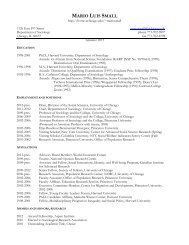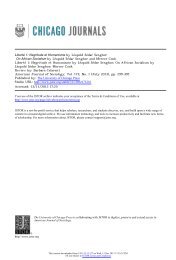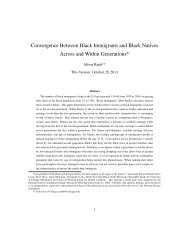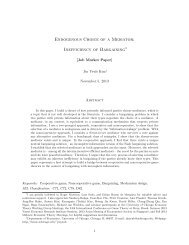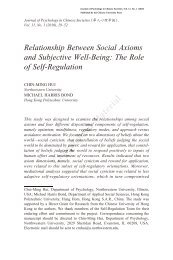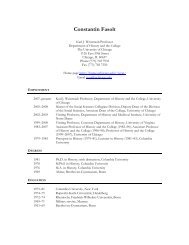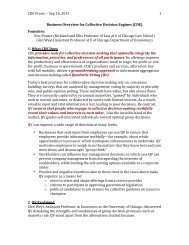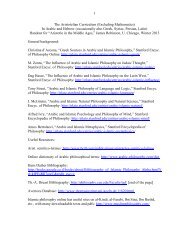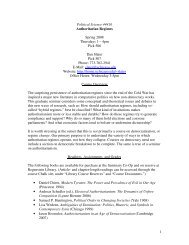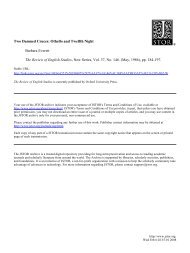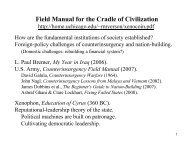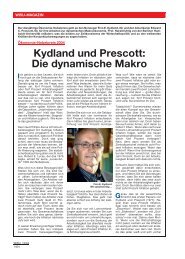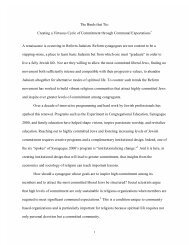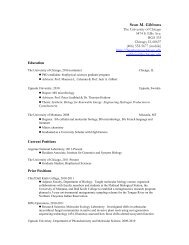Guide to the Study of Early Modern European History For Students ...
Guide to the Study of Early Modern European History For Students ...
Guide to the Study of Early Modern European History For Students ...
You also want an ePaper? Increase the reach of your titles
YUMPU automatically turns print PDFs into web optimized ePapers that Google loves.
Oberman and James Tracy (Leiden: E. J. Brill, 1994-95). This is a comprehensive collection<br />
<strong>of</strong> scholarly essays by recognized authorities in <strong>the</strong>ir respective fields. It is now more than<br />
fifteen years old, but it is still remarkably up-<strong>to</strong>-date. It is systematically subdivided according<br />
<strong>to</strong> subject matter, time, and geography. Each essay is accompanied by succinct<br />
bibliographies. As always, <strong>the</strong>re are some significant omissions, not <strong>to</strong> mention that <strong>the</strong>se<br />
volumes reflect <strong>the</strong> interests <strong>of</strong> <strong>the</strong>ir edi<strong>to</strong>rs in <strong>the</strong> his<strong>to</strong>ry <strong>of</strong> <strong>the</strong> Reformation quite directly.<br />
But <strong>the</strong> high quality <strong>of</strong> <strong>the</strong> essays and <strong>the</strong> bibliographies more than make up for <strong>the</strong><br />
deficiencies. The piece by Jan de Vries on early modern <strong>European</strong> population, for example,<br />
is one <strong>of</strong> <strong>the</strong> best short introductions <strong>to</strong> his<strong>to</strong>rical demography I know, and <strong>the</strong> essays by<br />
Philip Benedict on <strong>the</strong> French Reformation and Robert Kingdon on International Calvinism<br />
are superb. At <strong>the</strong> moment, this is probably <strong>the</strong> best available summary <strong>of</strong> current<br />
scholarship on early modern Europe in English.<br />
There are many o<strong>the</strong>r handbooks that follow <strong>the</strong> same basic model: essays by experts<br />
in <strong>the</strong>ir respective specialized fields, compiled by an edi<strong>to</strong>r in order <strong>to</strong> give reliable and<br />
comprehensive information about <strong>the</strong> field as a whole (see section 5.7.5 below). John Jeffries<br />
Martin, ed., The Renaissance World (New York - London: Routledge, 2007) and Andrew<br />
Pettegree, ed., The Reformation World (London - New York: Routledge, 2002) are good recent<br />
examples. The same is true <strong>of</strong> <strong>the</strong> "companions" <strong>to</strong> <strong>the</strong> Middle Ages, <strong>the</strong> Renaissance, <strong>the</strong><br />
Reformation, and various aspects <strong>of</strong> medieval and early modern his<strong>to</strong>ry that have recently<br />
been published by Cambridge and Blackwell.<br />
The disadvantage <strong>of</strong> such volumes is always <strong>the</strong> same: <strong>the</strong>y don't <strong>of</strong>fer a coherent<br />
narrative. Individual essays may be outstanding. But reading <strong>the</strong> whole volume cover-<strong>to</strong>cover<br />
can be painful. Since <strong>the</strong> essays are written by different scholars with different or even<br />
contradic<strong>to</strong>ry views, you will find yourself jerked around each time you start reading a new<br />
one. Merely recognizing <strong>the</strong> differences between individual authors is a complicated task in<br />
its own right. Such books are <strong>the</strong>refore not good for someone trying <strong>to</strong> make <strong>the</strong>ir first<br />
approach <strong>to</strong> <strong>the</strong> field as a whole. But <strong>the</strong>y are very good for those who want <strong>to</strong> fill in <strong>the</strong><br />
gaps in a body <strong>of</strong> knowledge that is already well developed. That is how I would advise you<br />
<strong>to</strong> use <strong>the</strong>m. If you have already read Koenigsberger's Europe in <strong>the</strong> Sixteenth Century and<br />
already have some sense <strong>of</strong> <strong>the</strong> fac<strong>to</strong>rs that may explain <strong>the</strong> growth in early modern<br />
population, but would like <strong>to</strong> know more, de Vries' essay on population in <strong>the</strong> Handbook <strong>of</strong><br />
<strong>European</strong> His<strong>to</strong>ry, 1400-1600: Late Middle Ages, Renaissance and Reformation edited by Brady,<br />
Oberman, and Tracy is perfect for you. But I wouldn't read it first.<br />
Finally <strong>the</strong>re are standard multi-volume handbooks <strong>of</strong> <strong>European</strong> his<strong>to</strong>ry like <strong>the</strong><br />
Cambridge <strong>Modern</strong> His<strong>to</strong>ry, <strong>the</strong> New Cambridge <strong>Modern</strong> His<strong>to</strong>ry (in which <strong>the</strong> Reformation volume<br />
is one <strong>of</strong> <strong>the</strong> few that have been published in thoroughly revised editions) and <strong>the</strong> later<br />
volumes <strong>of</strong> <strong>the</strong> Cambridge Medieval His<strong>to</strong>ry and <strong>the</strong> New Cambridge Medieval His<strong>to</strong>ry. These are<br />
not for <strong>the</strong> faint <strong>of</strong> heart. Their advantage is that <strong>the</strong>y are massive, detailed, and aim at <strong>the</strong><br />
most authoritative and comprehensive presentation <strong>of</strong> his<strong>to</strong>rical knowledge possible, <strong>of</strong>ten<br />
with comprehensive bibliographical references <strong>to</strong> both primary and secondary literature. In<br />
that regard <strong>the</strong>y are generally better than <strong>the</strong> more recent collections <strong>of</strong> essays. Their<br />
disadvantage is that <strong>the</strong>y are dated and that attempts <strong>to</strong> replace <strong>the</strong>m with more current<br />
versions cannot always be called successful. That makes <strong>the</strong>m perfect foils for anyone<br />
wishing <strong>to</strong> ascertain deeply entrenched views <strong>of</strong> <strong>the</strong> past. But it also makes <strong>the</strong>m hard<br />
reading.<br />
I might add, for those who read foreign languages, that <strong>the</strong>re are similar handbooks<br />
<strong>of</strong> <strong>European</strong> his<strong>to</strong>ry in German, Italian, French, and o<strong>the</strong>r <strong>European</strong> languages.<br />
Reading a general his<strong>to</strong>ry written by a German, French, or Italian his<strong>to</strong>rian is highly<br />
20<br />
20



